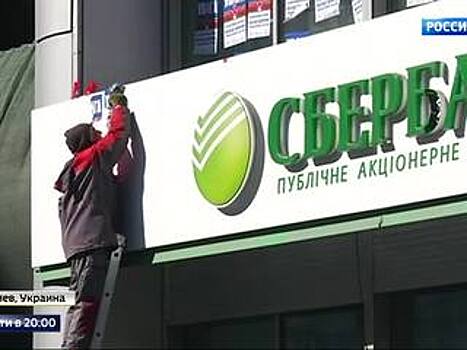Sberbank's Subsidiary is Leaving Ukraine
Sberbank is leaving the Ukrainian market. It was announced on Tuesday, that they're selling their Ukrainian subsidiary due to attacks from nationalists. The buyers are a Latvian Norvik Banka and a Belarusian company, owned by the British citizen, Said Gutseriev, a son of Russneft's owner from Russia, Mikhail Gutseriev. Said Gutseriev is the majority stockholder of the consortium. This deal hasn't gone unnoticed in the Kremlin. As the President's press-secretary Dmitry Peskov stated, they pay close attention to the fate of all Russian in companies in Ukraine. After all the latest events, Ukraine can now be considered a country with zero investment reliability. These word have already been confirmed by the investors, and not just the Russian ones. Ukraine is being abandoned by those, who just recently promised to support its economy with their dollars and euros. Earlier, by indulging the nationalists and encouraging their blockade, Kiev already deprived itself of Donbass coal. And now, thanks to the radicals, it's being deprived of an equally important fuel for the economy — investments. Ekaterina Mironova is reporting from Kiev. With all the hammering and drilling, a part of Vladimirskaya street has been closed off with construction tape. The wall, that's been the nationalists' pride for two weeks, is being taken apart block by block. The blue-and-yellow tents are gone. The flyers are mostly taken down. Here are the containers with solvent to remove the graffiti, left by the radicals. There are no more flags or slogans here. The main location of Sberbank in Kiev is unblocked. Today was the first work day. The public utilities are also taking care of business in Zaporozhye and Dnepropetrovsk. The nationalists announced the end to the blockade of Sberbank's offices before the subsidiaries were announced for sale. However, radicals stated in an article that this was just the first step, the second wave is coming. The pause is needed only so that Ukrainians can withdraw their savings. We're at war with Russia, not the Ukrainian citizens. Even though we're surprised that people still trust their money with the occupant's bank, 3 years into the war. So we're going to unblock the locations of the Russian banks for a short period of time, because we understand that their clients are regular people. It's unclear whether the nationalists' plans have changed due to the sale of the bank. Radicals have no comments on the issue. But one thing is clear — attracting investors to Ukraine will be harder than ever. The acute deficiency of foreign business in Kiev became obvious after Maidan. In just two years, the country went from 76th to 85th spot in the investment attractiveness rating. Scared by the instability and political corruption, foreign companies leave one after another. That's how the Tetra Pak packaging factory closed down in Kiev. Two Finnish representatives also left — the paint manufacturer, Tikkurila and Ruukki. Cushman & Wakefield, a consulting company, also closed their office. Another good example is the energy providers. We had plans for shale gas production. We had the American Shell and Chevron, who planned to come here for shale gas production. But ever since the events of 2014, plus a lack of economic feasibility for gas extraction, they simply left. That's just a small energy complex within Ukraine. Aircraft engineering is considered a lucrative investment in Kiev. Just two years ago they thought that foreign businesses are so interested in this industry, and that they're ready to invest big money. For example, the Antonov plant was supposed to manufacture at least 50 planes per year. But they are barely making ends meet. Foreign investors remain indifferent towards Ukrainian rocket production, shipyards, and high-technology industries. Automotive industry has dropped by 40%. Who needs investors, when the West is so enticing with its credits? Ukrainian authorities, only in theory, create the required conditions for foreign business. Kiev is way more eager to go into more debt. But it's all very fragile here, too. IMF has been thinking for over a week about another tranche.
